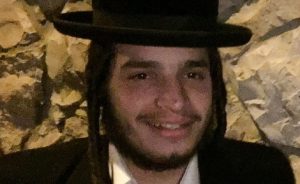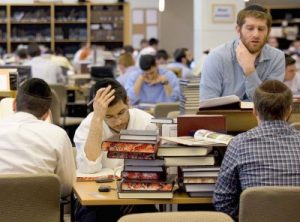by Rabbi Yaakov Menken and Rabbi Pesach Lerner/JNS.org
Responding to a dramatic decline in membership, the Conservative movement’s congregational arm has hired the Good Omen PR agency to survey hundreds of its members and “develop a new ‘position statement’ for the United Synagogue of Conservative Judaism.” Explaining their need, United Synagogue CEO Rabbi Steven Wernick described “a level of uncertainty about precisely where the ‘brand’ of Conservative Judaism sits in our members’ lives.” The problem, however, is far more essential than branding.
According to the Pew Survey, the once-dominant Conservative movement has lost one-third of its members in the past 25 years.1 It now comprises merely 18% of American Jews ““ and only 11% of those under 30. The Avi Chai Foundation Day School Census determined that Schechter school enrollment plummeted 44% in the past 15 years. Rabbi Wernick responds to these daunting numbers by saying, “we need to stop shraying our kups about everything that is bad, and get to work.” But will they do what must be done?
The movement has traveled this road before. Less than 30 years ago, there were early indications that the movement was past its heyday.2 At that time, the Jewish Theological Seminary (JTS), Rabbinical Assembly, and United Synagogue formed a joint commission to create a statement of principles for the future of the movement ““ a document called “Emet Ve’Emunah.”
It was hardly the success they touted it to be; the commission was unable even to agree upon Who or what it worships. Instead it validated perceptions of G-d as divergent as the Supreme Being found in the Bible, and a vague “god” who is “not a being to whom we can point,” but simply a force “present when we look for meaning.”3 The movement discarded previous standards and offered no guidelines ““ it simply endorsed the disparate views of its members.
Immediately prior to the establishment of JTS in 1886, Orthodox Rabbi J.D. Eisenstein wrote that “both the Conservatives and the Radicals are moving in the same direction. The only difference between them is time.” Throughout its history, the Conservative movement has attempted to span the chasm between the commitment to tradition of Orthodoxy and the open pursuit of American liberalism found in Reform — and has proven Rabbi Eisentein’s words prophetic. As the Reform movement moved inexorably further from the moorings of Jewish tradition, the Conservative “middle” followed it further out to sea.
Consider how Conservative Judaism has progressed from mixed pews to the present day. It now endorses same-sex marriage, and although it continues to prohibit intermarriage, it dropped its ban on interdating by United Synagogue Youth leaders just last year. If formal acceptance of intermarriage is subject to ‘rebranding’, is the conclusion in doubt? By following a poll of members, the PR-driven ‘brand’ of 2016 will be still more nebulous than the ‘principles’ of 1988. This may improve short-term retention, but will only hasten the movement’s decline.
This tragedy hits home. Just over a year ago, Daniel Gordis, grandson of the Chairman of the Commission that wrote Emet Ve’Emunah, authored “Conservative Judaism: A Requiem.” He wrote poignantly of the implosion of the Conservative movement, which he termed the direct consequence of “abandoning a commitment to Jewish substance.” In order to stand for something, a religious movement cannot rely upon “interviewing hundreds of [members]” to determine its standards. On the contrary, it must make demands.
In my youth, I (YM) was inspired by Solomon Schechter students who knew how to read Hebrew prayers. But in college I quickly realized that in order to find people who took Judaism seriously, you prayed with the Orthodox. And then I visited Jerusalem. The rest, as they say, is history.
Fifty years ago, much of American Jewry believed that the Orthodox were a dying vestige. Rather than accommodating its members, Orthodoxy did the opposite — expecting full-day Jewish education for every boy and girl. Every PR firm would have derided this as ridiculous. In just the past twenty years, however, enrollment in traditional Orthodox day schools has more than doubled.
The Conservative movement could still choose Jewish substance. At its founding, the movement unabashedly professed belief in the Diety Who gave our Torah, hired some of the greatest Talmudic scholars to teach at JTS, and expected a baseline of true Halachic observance from every Jew. Effort spent upon branding could be far better spent upon increasing the educational opportunities for its members, especially the declining numbers of young adults, to help them meet this standard.
Yes, returning to such high expectations will undoubtedly inspire the Jewishly uninspired to leave — but this has happened repeatedly throughout our history. Only those who retained “Jewish substance” retained Jewish grandchildren.
It would be tragic indeed if the movement were to try to hide its decline behind a marketing blitz, rather than refocusing upon the core tenets that have made Judaism relevant for thousands of years.
Rabbi Yaakov Menken is the Director of Project Genesis ““ Torah.org, and the co-Editor of Cross-Currents.com, an Orthodox on-line journal.
Rabbi Pesach Lerner is the Executive Vice President Emeritus of the National Council of Young Israel.
1 I no longer have the original source for our statement. I am aware that Steven Cohen, a respected sociologist and HUC professor, reports a smaller but still dramatic decline of 21% among “American Jewish adults who identify as Conservative and belong to a synagogue,” but that, of course, does not contradict a claim that self-identifying Conservative Jews have gone down over 33%.
Our statement is in accordance with the survey data, or could even underestimate the decline. The 1990 NJPS identified a “core Jewish population” of 5.5 million Jews, and 40.4% of households were identified as Conservative (p. 33), which would lead to an estimate of 2.23 million Conservative Jewish adults and children. The 2013 Pew Report used a somewhat different methodology to identify 6.7 million Jews, of whom 18% were identified with the Conservative movement, or 1.2 million. This would reflect a decline of over 45%, and adjusting the total population as determined in either 1990 or 2013 (as few believe the total Jewish population actually grew 20% during that 23 year interval) would only make the decline of those identifying themselves with the Conservative movement even steeper.
2 See statement of Robert Gordis, Chairman, on p. 14: “it is frequently proclaimed that Conservative Judaism is in decline.”
3 See pp. 17-18. Kassel Abelson, then President of the Rabbinical Assembly, writes on p. 6 that “we succeeded in setting forth various viewpoints in the same document without papering over our differences” and “we found ways to include multiple opinions without indicating a preference for one view over the other, since they were all legitimate points of view in Conservative Judaism.” Clearly, the very nature of G-d is among the areas where “multiple opinions” were deemed legitimate.

 There is an interesting interruption at the beginning of this week’s reading. Last week we learned about the construction of the Mishkan, the Tabernacle, and this week we learn about the garments worn by the Kohanim, the Priests, when they served within it.
There is an interesting interruption at the beginning of this week’s reading. Last week we learned about the construction of the Mishkan, the Tabernacle, and this week we learn about the garments worn by the Kohanim, the Priests, when they served within it. When I saw the headline for the article on Torah.org, “
When I saw the headline for the article on Torah.org, “ In this week’s reading, we are told that “Yisro heard all that G-d had done for Moshe and Israel his nation, for HaShem had taken Israel from Egypt” [18:1].
In this week’s reading, we are told that “Yisro heard all that G-d had done for Moshe and Israel his nation, for HaShem had taken Israel from Egypt” [18:1]. “When I got to the station, there was a Charedi bachur sitting there, and he asked me if he could help me. I told him the story and he told me: ‘I came here 25 minutes ago and saw the bag. I opened it and saw a large sum of money. I told myself that I’ll wait here a quarter of an hour, and if the man didn’t come, I’ll put up a note with the number of my cellphone so he could reach me.
“When I got to the station, there was a Charedi bachur sitting there, and he asked me if he could help me. I told him the story and he told me: ‘I came here 25 minutes ago and saw the bag. I opened it and saw a large sum of money. I told myself that I’ll wait here a quarter of an hour, and if the man didn’t come, I’ll put up a note with the number of my cellphone so he could reach me. Rabbi Yisrael Salanter, founder of the Mussar movement, explained the Mishnah as follows: When you take a dog out for a walk, the dog goes running ahead, and to the outside observer it might look like the dog is leading, and you are following. But what if you decide to turn right at a corner, and the dog continues on ahead? Within seconds, the dog will be out in front of you once again, running ahead in the new direction you have chosen. The dog isn’t really leading at all.
Rabbi Yisrael Salanter, founder of the Mussar movement, explained the Mishnah as follows: When you take a dog out for a walk, the dog goes running ahead, and to the outside observer it might look like the dog is leading, and you are following. But what if you decide to turn right at a corner, and the dog continues on ahead? Within seconds, the dog will be out in front of you once again, running ahead in the new direction you have chosen. The dog isn’t really leading at all. The Biblical Book of Exodus begins with the tale of Pharoah and the Jews under Egyptian rule. Most people are at least vaguely familiar with the story, but few notice that it is the first account of organized, institutional anti-Semitism against the Jews.
The Biblical Book of Exodus begins with the tale of Pharoah and the Jews under Egyptian rule. Most people are at least vaguely familiar with the story, but few notice that it is the first account of organized, institutional anti-Semitism against the Jews. In this week’s reading, Yaakov parcels out blessings to his sons, based upon his prophetic understanding of their futures. He describes Yissachar as a strong-boned donkey, who saw that “rest” was good, yet “bent his shoulder to bear, and became a servant to tasks” [49:14-15].
In this week’s reading, Yaakov parcels out blessings to his sons, based upon his prophetic understanding of their futures. He describes Yissachar as a strong-boned donkey, who saw that “rest” was good, yet “bent his shoulder to bear, and became a servant to tasks” [49:14-15].